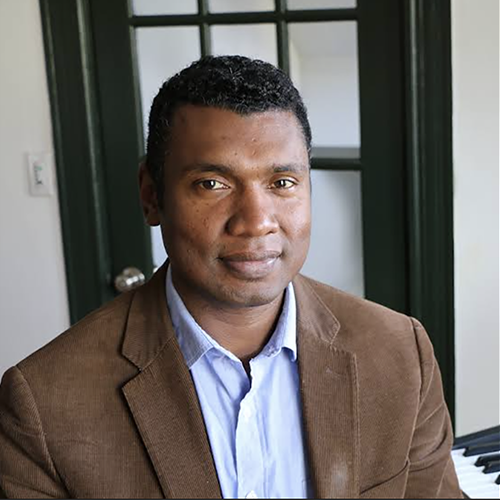
Dr. Stephon Alexander, is a musician and professor of physics and astronomy at Brown University (Providence, RI), and author of The Jazz of Physics: The Secret Link between Music and the Structure of the Universe.
As a theoretical physicist, jazz saxophonist and author, Alexander specializes in the connections between cosmology, particle physics and quantum gravity exploring interconnections between music, physics, mathematics and technology.
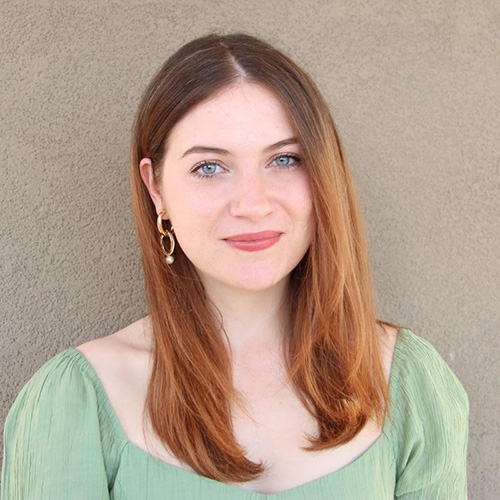
Rachel Cionitti is currently a graduate student at the University of Missouri-Kansas City, aiming for a PHD in physics, with an astronomy emphasis.
She has experience in astronomical research, outreach, and has been serving as either a physics tutor or graduate teaching assistant for over two years. She is motivated in equal amounts by advancing the field of astronomy, and making it accessible and digestible, so that anyone of any education level can engage with it.

Mitch Cloud is a therapist and elementary school counselor in Olathe, Kansas. Inspired by his school’s successful ham radio contact with Astronaut Woody Hoburg on the International Space Station, he delved into the world of ham radio and found a vibrant community passionate about science, space, and technology. His primary interest in astronomy has been enriched by his experiences in ham radio. He is excited to share his knowledge of astronomy and radio with others.
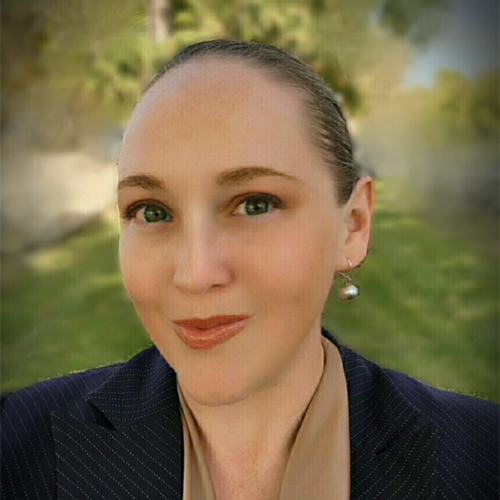
Jena Dunham, DNP, APRN, FNP-C, PMHNP-BC, NREMT
Director of Medical Services
Pronouns: she, her, hers (What is this?)
Jena Dunham is a passionate amateur astronomer with a deep love for exploring the cosmos. She has enjoyed the community service offered at Powell Observatory since she was a young child and now gives back to this outstanding organization through her volunteer work where she has assisted with several projects and has served as member of the Board of Directors since June of 2022. She is also an avid amateur radio operator, utilizing her skills to communicate and connect with fellow enthusiasts worldwide.
In addition to their astronomical pursuits, Jena Dunham holds a Doctor of Nursing Practice (DNP) degree, bringing a unique perspective to the intersection of healthcare and technology. Currently serving as the Director of Medical Services at Pawnee Mental Health Services, she is dedicated to improving patient care and promoting innovative medical practices.
Her diverse background and expertise allow her to bring valuable insights into the STEAM education and outreach programs she is involved in.

Ryan Goodson is founder and owner of New Moon Telescopes. Originally from Oklahoma City, he now resides outside the Richmond, Virginia area with his family where he enjoys observing, doing outreach with local clubs, and of course, building NNTs. He’s a runner, coach and board member of his local YMCA.
Ryan serves as a volunteer System Ambassador through JPL and delights in hosting outreach events focused on engaging the next generation of astronomers.

Scott Harrington is a 30-year-old amateur astronomer from northern Arkansas who lives under very dark skies. At the age of 14, he got interested in astronomy and became an avid observer. He is known for such extraordinary observations as seeing 80 globular clusters in handheld 8×56 binoculars and 200 planetary nebula in a 130mm reflector. However, sharing such observations to encourage others is paramount to him, which is why he enjoys creating free digital publications. His knack for research and writing recently made him currently the youngest Contributing Editor for Sky & Telescope magazine. He also writes for the Reflector, Deep-Sky Observer, and Amateur Astronomy. He has co-authored several scientific papers on the brightness of satellite constellations and was awarded a Lifetime Membership by the Astronomical League.
The most-used telescope in his possession is a 1982 Meade 10-inch Schmidt–Cassegrain, passed down to him from his father and grand father. While it’s allowed him to accomplish some incredible visual feats, he gets great joy from using simple, handheld binoculars and unaided eyes. In 2018, he published a free eBook titled 250+ Deep-Sky Objects Visible with 7×35 Binoculars and the Naked-Eye. It is the culmination of a survey he performed in his first ten years as an amateur astronomer, though he continues to makes revisions to it as he discovers the visibility of new objects such as the VY CMa nebula!
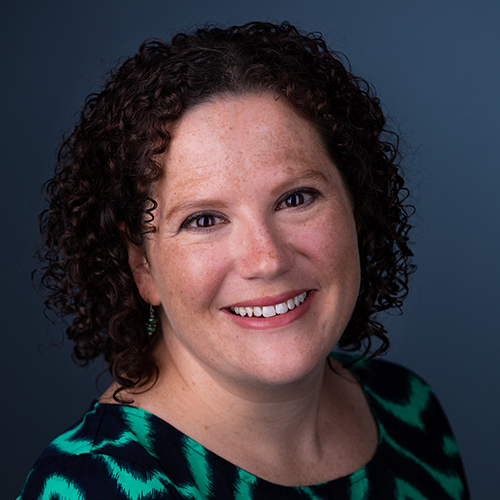
Dr. Allison Kirkpatrick is an observational astrophysicist who studies how supermassive black holes form and evolve.
She has won observing time on the best telescopes in the world, including the NASA’s new flagship—the James Webb Space Telescope. Her work has been featured in Nature, the Washington Post, Kansas Public Radio, VICE, and numerous other outlets.
Her body of work has broken conventional ideas about how supermassive black holes evolve.
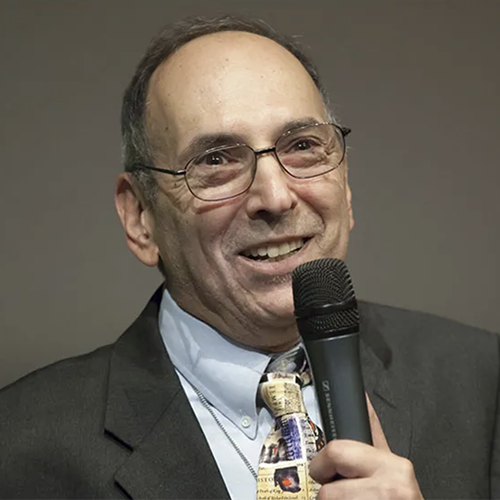
Dr. David Levy is an Emmy Award winning amateur astronomer, science writer and discoverer of comets and minor planets, who co-discovered Comet Shoemaker–Levy 9 in 1993. Awarded a Ph.D. from the Hebrew University of Jerusalem, Levy has written 34 books including The Quest for Comets, as well as a poignant biography of Pluto-discoverer Clyde Tombaugh.

Dr. Ryan Maderak (Ph.D. Astronomy, Indiana University) is Associate Professor and Chair of Physics and Astronomy at Benedictine College, and director of Benedictine’s Daglen Observatory. His expertise is stellar spectroscopy, with doctoral research on chemical abundances of open clusters, and current research at Daglen Observtory on spectroscopic monitoring of RV Tauri and Semi Regular variables. He has extensive experience in public education and outreach, and has worked closely with the amateur astronomy community.
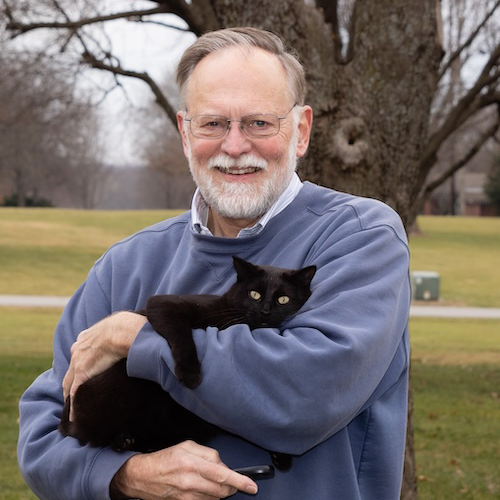
David McCallie, MD recently retired after a long career at Cerner, a medical software company here in KC, where he was SVP responsible for Medical Informatics. He was born in Chattanooga TN and moved to the KC area about 30 years ago. He has training in both medicine and engineering, but it was his interest in nature photography that led him to learn astrophotography. A colleague showed him his pictures of the Horsehead Nebula, and he was stunned that an amateur photographer could capture something so beautiful and so distant, so he was determined to learn how to do it himself!
He has been a member of the ASKC since 2019 and has served on the ASKC Board for the last several years. He enjoys using the telescopes at Powell Observatory to share the wonders of nature with the public

Lou Mayo is a planetary scientist with over 40 years supporting NASA planetary research, space missions, and space science data centers. He was a member of both Voyager IRIS and Cassini CIRS IR Instrument teams, conducting instrument calibration, ground system design, and planetary atmospheres research. He is currently Chief Scientist for GAMA-1 Technologies and Professor of Astronomy at Marymount University.
Lou is also heavily involved in astronomy outreach and public communication. For over 30 years, he has led NASA teams bringing space science mission science and discovery to the country, including both Venus Transits and the 2017 and 2024 solar eclipses across America. For NASA’s Science Mission Directorate, he has spearheaded astronomy education programs for Girl Scouts, Amateur Astronomers, university professors, and K-12 educators. Lou is currently Co-I and Program Manager for NASA’s SolarSTEAM heliophysics education program delivering space science research, missions, and discoveries to the nation and he is featured on the live YouTube show, “Space Oddities” which streams Tuesdays at 2:00 p.m. CDT.

Garrett Parkins is a lead fluids design engineer at Kennedy Space Center. He has over five years of experience designing ground systems for NASA’s Artemis Program. Artemis I was the first mission he worked on, and he is currently involved with preparations for Artemis II. He is an enthusiastic proponent of space exploration in general, and human spaceflight in particular. He rarely misses a rocket launch.
Garrett is a Kansas City native, and is still a midwesterner at heart. He is a graduate of Kansas State University (B.S. ME 2016) and Auburn University (M.S. AE 2018).
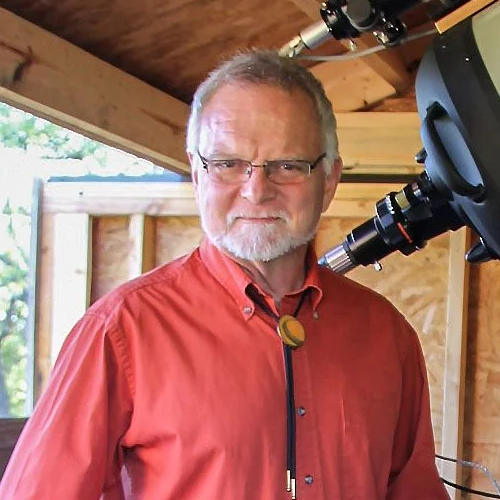
Robert Reeves, an astronomy enthusiast since 1958, has dedicated his life to exploring the cosmos. His journey began with capturing lunar photographs in high school, leading to notable achievements such as winning a trip to the Johnson Space Center in 1965. Over the years, he’s honed his skills using various telescopes, including his cherished Celestron 8 acquired in 1975, and a Celestron 8-inch Schmidt camera used for deep-sky photography until 2002. Currently, he uses a Celestron 11 Edge HD and a Sky-Watcher 180mm Maksutov for lunar photography from his Perspective Observatory in central Texas, along with other telescopes for visual observation and deep-sky photography.
Reeves is not just an observer but also a prolific writer, with over 250 articles published in esteemed astronomy magazines and several authored books, including “The Superpower Space Race” and “Exploring the Moon with Robert Reeves“. His focus lies in demystifying lunar exploration, sharing insights on its history, evolution, and geology while pioneering techniques that empower amateur astronomers.
A sought-after speaker, Reeves has graced numerous astronomy events worldwide, including being the first Westerner to address China’s astronomy community. He also represents Celestron at astronomical conventions, furthering his commitment to popularizing astronomy.
Continuing his passion, Reeves shares daily lunar photographs and insights through “Postcards from the Moon”. His contributions to astronomy have been recognized with the naming of asteroid 26591 “Robertreeves” in his honor and 26592 “Maryrenfro” after his wife, making them the only husband-wife duo with sequentially numbered asteroids.
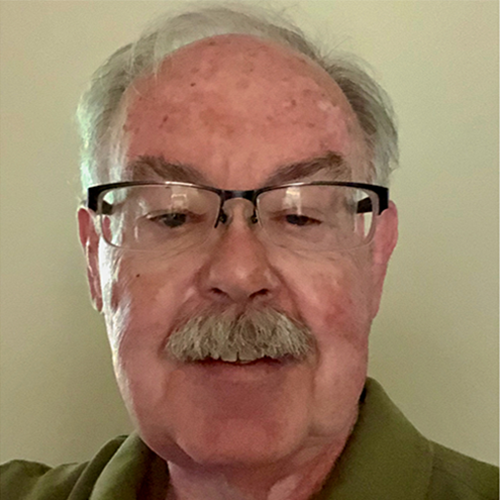
Stuart Riley, Ph.D Electrical Engineering, MIT
Member of Board of Directors at Large, ASKC, Warkoczewski Award holder
Stuart has lived in the Midwest central United States most of his life. He has lived in Kansas, Minnesota, Iowa, Texas, Arkansas and now Missouri.
Stuart has attended and participated in many astronomy clubs and has interests in double stars, variable stars, star clusters, solar sciences and planetary nebulae. He was the 2010 recipient of ASKC’s Helen A. Warkoczewski Award for “Outstanding Contributions to Astronomy.”
He is a member of the Astronomy League through the ASKC, having joined in 1997. When he moved from Kansas to Arkansas, he was a part of the Sugar Creek Astronomical Society in northwest Arkansas and participated in community outreach programs, including teaching astronomy, the night skies and exploring our universe as nature and science ambassador. While in Arkansas, he participated with the Pittsburg State College observers, South Central Missouri Astronomers and Northwest Arkansas Star Gazers.
Following his move back to Kansas City, he became a member of the Warkoczewski Observatory staff in at UMKC in mid-town Kansas City. He enjoys outreach and teaching the public and interested students in searching and learning the night skies.

Tim Russ is best known for his role as Lieutenant Commander Tuvok in the TV series Star Trek: Voyager. Russ has been working as an actor, director and musician for the past thirty-five years.
His talents encompass a wide spectrum of the performing arts including composing, musical performances, writing, producing, directing, and he is an avid amateur astronomer.
He has been a member of the Los Angeles Astronomical Society for about 30 years and is involved in community outreach.

Dr. Keivan Stassun holds the Stevenson chair in Physics and Astronomy at Vanderbilt University (Nashville, TN).
A passionate leader and advocate for broadening participation in STEM, especially of underrepresented minorities and persons with disabilities, he currently serves as founding director of the Frist Center for Autism and Innovation in Vanderbilt’s School of Engineering.
In January of 2022, Dr. Stassun was appointed by President Joe Biden to serve on the National Science Board.

Jen Winter is Co-Winner of the very first Astro Oscar, Jen Winter has minor planet 37601VicJen named for her and her late husband Vic, for their outreach efforts. Serving as editor of the Astronomical League Reflector and JPL Solar System Ambassador she has been an astrophotographer since 1998 with several APOD, magazine and textbook publishings. Jen was founder of the not-for-profit StarGarden Foundation for Astronomy outreach. Jen has witnessed 11 total and 3 annular solar eclipses and has flown in Russia’s zero gravity aircraft at Moscow’s Space City training facility.
In her early astronomy career, Jen formed Astronomical Tours a company which organized and led dozens of international eclipse and astronomical expeditions. She led the Southern Skies Star Party on the shores of Lake Titicaca in Bolivia for 12 years. She chartered cruise ships, yachts, passenger aircraft, camels and cargo vessels to all 7 continents. She even found a meteorite on one of these eclipse trips. Wherever Jen led a group, she always coordinated with locals to support local education and astronomy efforts.
Now, as the owner of Daystar Filters since 2006, Jen designs and fabricates solar filters, telescopes and eclipse glasses at their growing manufacturing facility. Since she owned the company, she designed modernized production and testing equipment and methodologies. Her new innovations in product design have brought down the cost of entry for mid to large aperture H alpha solar observing. Jen and her team today develop and build customized solutions for some of the worlds’ top researchers both on earth and in space.
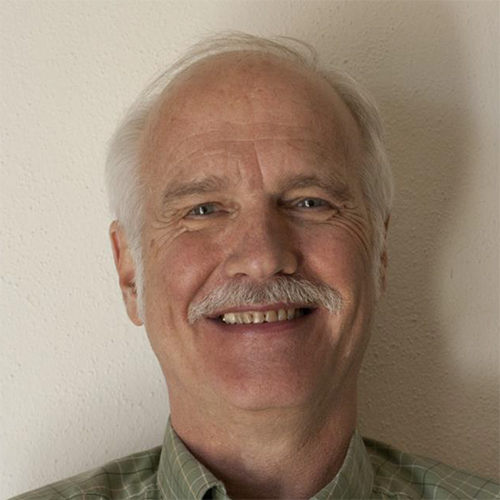
William “Bill” Wren has been fascinated by the night sky all his life. He earned degrees in Philosophy and Educational Psychology at the University of Texas. He audited courses in the Astronomy Department, and was an academic tutor for undergraduate students in astronomy.
In 1990, Bill started work at McDonald Observatory as a Public Affairs Specialist and part-time researcher, leading a search for extra-galactic supernovae. He also helped design and build several unique telescopes, one of which is wheelchair accessible and dedicated for public use at the Observatory’s Visitors Center. He was the Commissioning Telescope Operator of the 10-meter Hobby-Eberly Telescope.
Bill has long been actively involved in protecting the Observatory’s dark night skies, an endeavor which became his full-time responsibility. His greatest satisfaction during his career at McDonald came from conveying the wonders of the universe to the tens of thousands of people who visit the site each year.
Bill retired in 2022 and relocated to his birthplace, Kansas City.